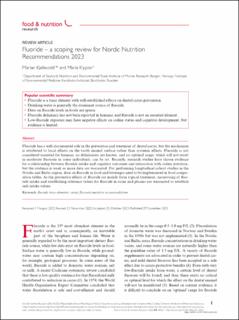Fluoride – a scoping review for Nordic Nutrition Recommendations 2023
| dc.contributor.author | Kjellevold, Marian | |
| dc.contributor.author | Kippler, Maria | |
| dc.date.accessioned | 2024-01-26T09:34:56Z | |
| dc.date.available | 2024-01-26T09:34:56Z | |
| dc.date.created | 2024-01-18T14:58:42Z | |
| dc.date.issued | 2023 | |
| dc.identifier.citation | Food & Nutrition Research (FNR). 2023, 67 . | |
| dc.identifier.issn | 1654-6628 | |
| dc.identifier.uri | https://hdl.handle.net/11250/3114041 | |
| dc.description.abstract | Fluoride has a well-documented role in the prevention and treatment of dental caries, but the mechanism is attributed to local effects on the tooth enamel surface rather than systemic effects. Fluoride is not considered essential for humans, no deficiencies are known, and no optimal range, which will not result in moderate fluorosis in some individuals, can be set. Recently, research studies have shown evidence for a relationship between fluoride intake and cognitive outcomes and interaction with iodine nutrition, but the evidence is weak so more data are warranted. For performing longitudinal cohort studies in the Nordic and Baltic region, data on fluoride in food and beverages need to be implemented in food composition tables. As the preventive effects of fluoride are mainly from topical treatment, monitoring of fluoride intake and establishing reference values for fluoride in urine and plasma are warranted to establish safe intake values. | |
| dc.language.iso | eng | |
| dc.title | Fluoride – a scoping review for Nordic Nutrition Recommendations 2023 | |
| dc.title.alternative | Fluoride – a scoping review for Nordic Nutrition Recommendations 2023 | |
| dc.type | Peer reviewed | |
| dc.type | Journal article | |
| dc.description.version | publishedVersion | |
| dc.source.pagenumber | 7 | |
| dc.source.volume | 67 | |
| dc.source.journal | Food & Nutrition Research (FNR) | |
| dc.identifier.doi | 10.29219/fnr.v67.10327 | |
| dc.identifier.cristin | 2229719 | |
| cristin.ispublished | true | |
| cristin.fulltext | original | |
| cristin.qualitycode | 1 |
Tilhørende fil(er)
Denne innførselen finnes i følgende samling(er)
-
Articles [3001]
-
Publikasjoner fra CRIStin [3025]
